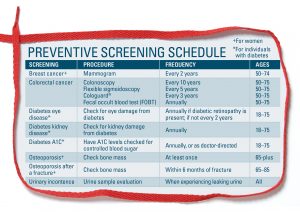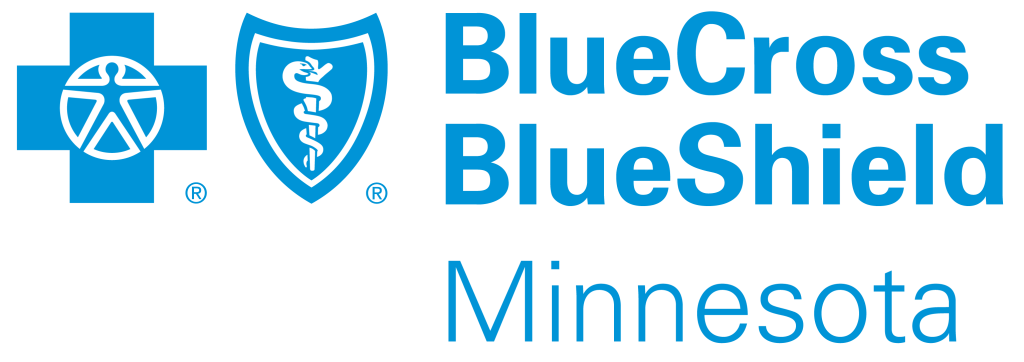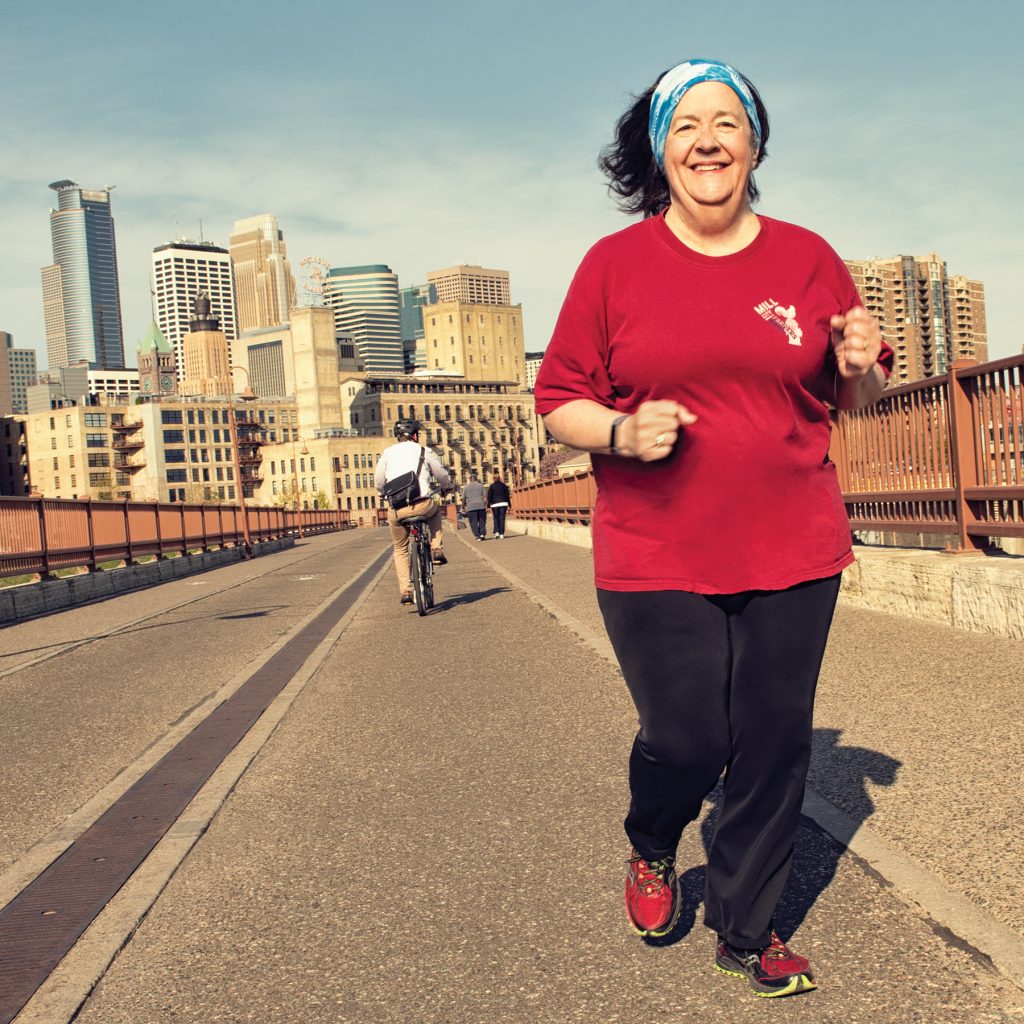Claudia Kittock, an energetic 65-year-old Minneapolis resident and Saint Mary’s University of Minnesota professor, generally adheres to all medical recommendations and lives a healthy life. But 12 years ago, Kittock was busy raising a family and caring for her ailing mother and father, so she put her own health care needs on hold. After her parent’s deaths, just two years apart, she felt run down and at her sister’s request, scheduled a physical, which led to a routine colonoscopy that was a few years overdue.
“About 30 seconds into my first colonoscopy, the doctor said, ‘Oh look, there’s cancer,’” Kittock says. The diagnosis started her on a journey that would include two surgeries to remove sections of her colon and liver, 32 radiation treatments and two six-month rounds of chemotherapy during a two-year period. Other than feeling worn out prior to the diagnoses, she showed no signs of colon cancer, had no family history, and was in good health. The screening, she says, helped save her life. When many older adults hear that they need to be in charge of managing their health, they think that means eating better and getting enough sleep and exercise. While those components are important, there’s one more to add to the list: go to the doctor. While it might be natural to associate doctor visits with being sick, that’s far from the whole story. Regular check-ups with your physician for preventive care and medical screenings, as Kittock can attest, are among the best ways to stay on top of health issues before they have a chance to become serious conditions.
SHIFTING PRIORITIES
Improved medical care and better prevention for a whole host of diseases has resulted in dramatic increases in life expectancy in the U.S. In fact, the World Health Organization estimates that by 2030, the average life expectancy in this country will be nearly 80 for men and 83 for women, up from 67 for men and 74 for women 50 years ago. But with these advances has come a major shift in the leading causes of death. Unlike at the turn of the 20th century, when men and women were dying from infectious diseases and acute illnesses, today’s older Americans are more likely to succumb to chronic diseases and degenerative illnesses. The top three leading causes of death for adults 65 and older are heart disease, cancer, and stroke, according to the Centers for Disease Control and Prevention. A healthy diet, not smoking, and regular exercise can go a long way in staving off the risk factors that lead to these and other chronic conditions. So can wellness screenings that account for specific issues that we all face as we age.
Dr. James Pacala is a geriatric specialist and associate head of the department of family medicine and community health at the University of Minnesota. While he is a big proponent of wellness exams and screenings, he cautions that they are not all necessary at certain ages. The challenge is to speak with your primary care physician to determine the tests you need and the ones that you can forgo without compromising your health. Among the screenings Dr. Pacala says are necessary and important are immunizations. For adults 65 and older, he recommends an annual flu shot as well as vaccines for pneumococcal pneumonia (one to two doses) and shingles (one dose). A thorough wellness visit for older adults should also include talk of issues that become more common as we age. Jean Wyman, a professor in the school of nursing at the University of Minnesota, says doctors should ask about any recent falls or if the patient has a fear of falling. There should also be questions relating to hearing and vision loss, physical activity, urinary incontinence, depression, weight loss, and dementia. Those issues can signal other more serious issues. If a patient is underweight, for example, that could indicate poor nutrition, which can lead to weakness and further frailty. “A good primary care physician will address these issues in a wellness exam and recommend further treatment or a specialist if something is discovered,” she says.
SCREENING FOR CANCER
When it comes to cancer screenings, such as mammograms, prostate exams, and pap smears, the picture is not as clear. That’s because while medical experts say screenings are an important way to detect cancer before it causes problems, there are certain cancers that become less common as we age. For instance, the chance of a woman developing cervical cancer actually decreases with age, which is why the American College of Obstetricians and Gynecologists (ACOG) recommends that women 65 and older who have had three negative pap smears in a row no longer need to get screened. The occurrence of breast cancer, however, continues to increase as a woman ages, so yearly breast exams are recommended, as are mammograms every two years for women ages 50–74.
After 75, experts say women should discuss risk factors with their doctors and whether the test is needed. For men, a clinical testicular exam is recommended around age 50, but an annual prostate exam is not. “When you screen for prostate cancer in older men you find a lot of it,” says Dr. Pacala, who notes that about 2 to 3 percent of men die from prostate cancer in any given year. “Many more men die with prostate cancer than of prostate cancer,” he adds.
Colonoscopies are still recommended for both men and women starting at age 50 and then every 10 years thereafter. There are at-home colon cancer screening tests, that, unlike a traditional colonoscopy, do not require special preparation or diet and medication changes. But, if an at-home test comes back positive, you would still need to have a diagnostic colonoscopy. And, at-home tests are not for those with a personal or family history of colon cancer, and should be used carefully by those over 75 since the rate of false-positives (the test indicates there is cancer when there is none) increases with age. For any test or screening, talk to your doctor about what is best for you. Staying on schedule with wellness exams and screenings may seem like a time-consuming endeavor, but the payoff is worth it, says Kittock, who has been cancer-free since her last surgery in 2007.
Cancer made her a staunch advocate of screenings. It also sharpened her perspective on life and gave her a stronger sense of urgency about things she cares about. “Things that I had always been passionate about before or cared about before, now have a different intensity. What are you waiting for?” She also found a new passion in running. She started running during chemotherapy as an activity she could “conquer” at a time when so much was beyond her control. It is still a part of her health regimen today—along with routine doctor visits. For anyone putting off a screening or a trip to the doctor, Kittock wants to stand out as an example of their importance. “Because this is a big nothing compared to what follows if you don’t do it,” she says.

![]()
![]()


